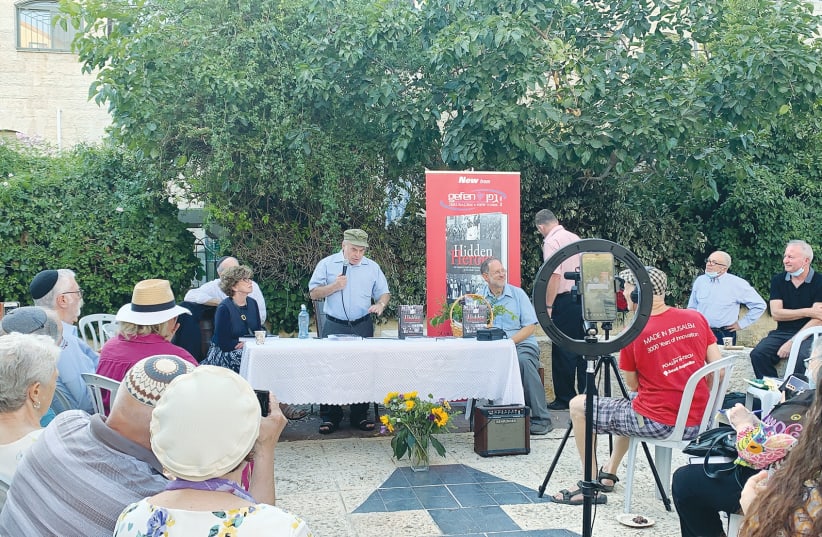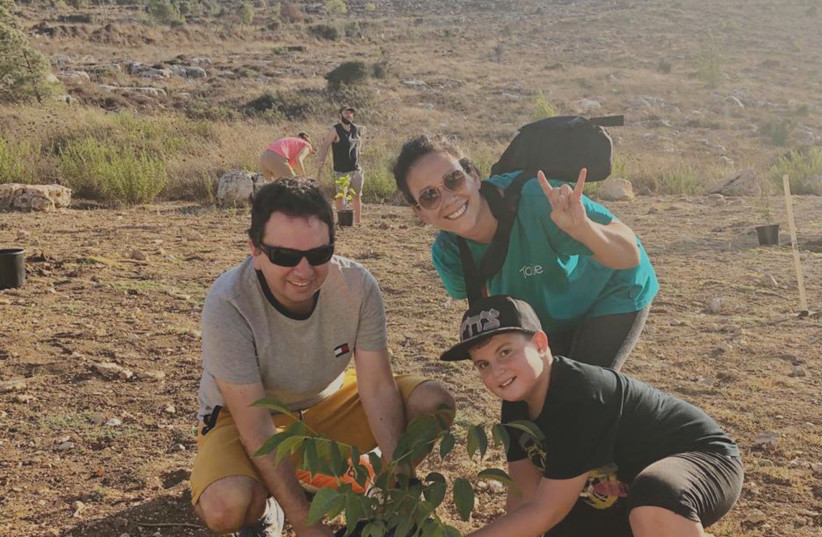Several hotels around the country will have synagogue services either in the open or in a banquet or meeting hall set aside for the purpose. Some hotels have permanent synagogues which are in use all year round. Visitors to Jerusalem, as well as those living in Talbiyeh, Rehavia, Mamilla, German Colony, Katamon, Baka and immediate surrounds, should be aware that, as it did last Rosh Hashanah, the Chabad Center of Talbiya-Mamilla, is once again organizing Rosh Hashanah prayer services in Sokolov Park which is easily accessible from Keren Hayesod, Ahad Ha’am, Sokolov and Jabotinsky Streets. Prayers will be led by the renowned Cantor Yisrael Hershkowitz and his sons. The maariv service on Monday night will be at 7:30 p.m., and morning services on Tuesday and Wednesday will begin at 8 a.m. with Shofar blowing at 10:50 a.m.
Services will be held in an open tent, with separate seating for men and women, but as was the case last year when Conservative and Reform worshipers joined the service in the park, husbands and wives sat together on park benches or on the grass surrounding the tent. Ultra-Orthodox Jews who also joined the service stood outside the park’s stone fence. Overall, it was a wonderful example of Jewish pluralism meeting Jewish unity, with everyone doing their own thing – but doing it together – something it took a virus to accomplish.
■ VISITORS AND local Jerusalemites who in the past have enjoyed the grandeur and the wonderful choir of the Great Synagogue conducted by Elie Jaffe, will not be able to repeat that experience on Rosh Hashanah and Yom Kippur unless they have actually purchased a seat. There is no point in trying to get in because the security guards at the entrance have strict instructions not to allow anyone past the door unless they can show a green pass or vaccination certificate and an entry ticket that entitles them to a seat. Congregants are instructed to keep their masks on at all times and to make sure that both their mouths and noses are covered. In pre-COVID years, large contingents of Christians from many countries who were in Israel for the Feast of Tabernacles hosted by the International Christian Embassy Jerusalem, came to the Great Synagogue, the Conservative Synagogue and the nearby Reform Synagogue on Yom Kippur to experience the beauty of a Yom Kippur Service.
■ IT WAS billed as a book launch but was more in the nature of a reunion. According to the author Pamela Braun Cohen, some of the people present had not seen each other in 45 years. Approximately half were immigrants from the former Soviet Union and a slightly larger number were American expatriates or Americans with homes in Israel, who divide their time between the two countries. What they had in common – despite geographic, linguistic and cultural differences – was that they had all been involved in one way or another in the struggle for Soviet Jewry and that their reaching out to each other had changed their lives and the course of history. Without the efforts of the million-plus immigrants from the former Soviet Union, Israel would not have been able to attain some of the many cultural, technological and entrepreneurial achievements that it has to its credit. The book, published by Gefen, is called Hidden Heroes, for indeed each and every person who risked life and limb in defying the Soviet authorities – in surviving long prison terms replete with torture and starvation; who smuggled letters, reports and essays to the west; who conducted or attended clandestine classes in Hebrew and Jewish history – was a hero. So were Jews from the west who went to Russia, met with refuseniks, listened to their stories, became passionately committed to securing the freedom of Soviet Jewry and returned to their home countries to trumpet the cause of “Let my people go.”
Cohen could not tell all their stories, but she told enough to create a book that is not only of historic importance but also a good read. Many of the former refuseniks and Prisoners of Zion had not seen each other or their American morale boosters and supporters in years. Getting together in Jerusalem was for all those present, a very emotional experience. Natan Sharansky, the most widely known of them all, happily chatted with former “comrades in arms.” In a brief address, he recalled how the KGB used to mock him telling him that no one in the outside world cared about him and his colleagues and that the only support they had was from a bunch of housewives and students.
As far as Sharansky and so many others are concerned, those housewives and students changed history.
Cohen who had been one of those housewives first traveled with her husband Lenny from their home in Chicago to Russia in 1978. Cohen subsequently became the co-president of the Union of Councils for Soviet Jews, which included close to fifty councils and affiliates across the US.
The event was held at the home of another former Soviet Jewry activist, Yossi Abramowitz, and his wife Rabbi Susan Silverman. Abramowitz who is known internationally for his work in bringing solar energy to developing countries was working in Boston on behalf of Soviet Jewry and succeeded. At that time, he was among the students to which Sharansky referred and was the chairperson of the World Union of Jewish Students.
At the launch, he urged the public to “read this book and remember the people who were behind the struggle.”
Cohen read excerpts from the book and reviewed how she and her husband had become involved as had so many other American Jews, spoke of meetings with Russian Jews which had inspired them, and the work in getting American politicians to raise their voices on behalf of Soviet Jewry. Towards the end of the book launch, a man in a dark suit with a large black kippa on his head and ritual fringes extending from beneath his jacket approached the head table and said that he was one of those Jews who had been released by Cohen. Originally from St. Petersburg (then Leningrad), he had been detained by police forty times. He had also been arrested. Cohen had telephoned him every week for hour-long conversations. His name was Chaim Burshtein, and Cohen recalled that the late Jerusalem Post journalist – Los Angeles-born Louis Rapaport who died ten years ago – had been very interested in Soviet Jewry. After meeting with UCSJ, Rapaport had gone to Russia where he met with Burshtein. The extensive interview was published in The Jerusalem Post.
Gefen Publishing CEO Ilan Greenfield recalled that one of the first books published by his company had been written by Rapaport. It was about Peter Bergson (the alias used by Hillel Kook) who during the Holocaust years had tried to alert America to what was happening to the Jews of Europe, just as Cohen and others like her tried to alert America to what was happening to the Jews of the Soviet Union.
■ EVEN BEFORE the Cabinet decision this week on a NIS 63 million rehabilitation plan for dealing with the damage caused by fires in and around Jerusalem last month, Treellion, had already begun operations on their plan for encouraging local residents to plant saplings in place of the thousands of hectares of forest and natural growth that had been destroyed. Treellion is an initiative of Jerusalemite Eran Rogel, together with the Jerusalem Municipality, and Sinsila, the East Jerusalem Center dedicated to empowering local communities through education, inspiration and employment.
Just as Arabs and Jews worked together to fight the fires, they are working together to replace the forests. The joint enterprise gives everyone involved a better appreciation of nature and helps to create new bonds of friendship. This week, some 60 Jews and Arabs came together at Hamesila Park, to plant the beginnings of a Middle East orchard under the joint auspices of Treellion, Sinsila and the Shefa Department of the Jerusalem Municipality.
In Hebrew, the name given to the new grove is Bustan Lekulan, which translates as an orchard for all. Eventually, it will be filled with flowers and fruit trees where people from all over the capital can enjoy activities and share friendships.
■ THE ARAB aptitude for technology should not be underestimated. When Arab hi-tech geeks had difficulty in finding work in Israeli hi-tech enterprises, they started their own and are doing very nicely, despite the many challenges and obstacles.
In recent years, there has been a significant improvement in Arab technologists entering the Israeli workforce, and cooperation between Jews and Arabs in the various spheres of hi-tech has led to a singular Hackathon which will be held this weekend in Nazareth and will be dedicated to finding and developing technological solutions that will help eradicate the violence which has overwhelmed Arab society and has sullied its reputation. Most Israeli Arabs are good, law-abiding citizens, who want to provide for their families and get on with their lives. But the actions of a few criminal elements that – unlike the Sicilian Mafia – have no compunction about killing women and children, have cast all Arabs in a negative light.
Umm el-Fahm Mayor Dr. Samir Mahamid in an interview on KAN Reshet Bet, commented that the abilities of the Israeli security forces are legendary except when it comes to preventing violent crime in Arab society.
If manpower can’t achieve the desired goal, perhaps technology can.
More than 250 Arab and Jewish hi-tech engineers and 55 mentors who hold key positions in Israeli hi-tech will take part in the Hackathon, which will produce technological solutions that could prevent further casualties in what seems like an endless cycle of violence.
Nazareth has developed 100 start-ups and has more than 40 technology companies operating in its territory. Leading this initiative are Sami Saadi, co-CEO of Tsofen, a nonprofit organization aspiring to develop the hi-tech sector in the Arab community; Yulia Eita, head of the Diversity in Employment Administration for Special Populations at the Ministry of Labor, Social Affairs and Social Services and Karin Meir-Rubinstein, CEO & president of Israel Advanced Technology Industries. For further information and registration contact: Yarden Assraf, 054-2299119

